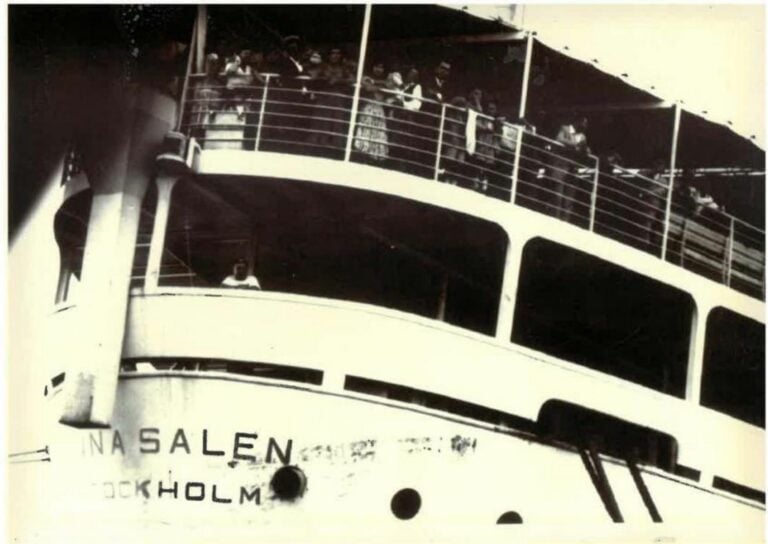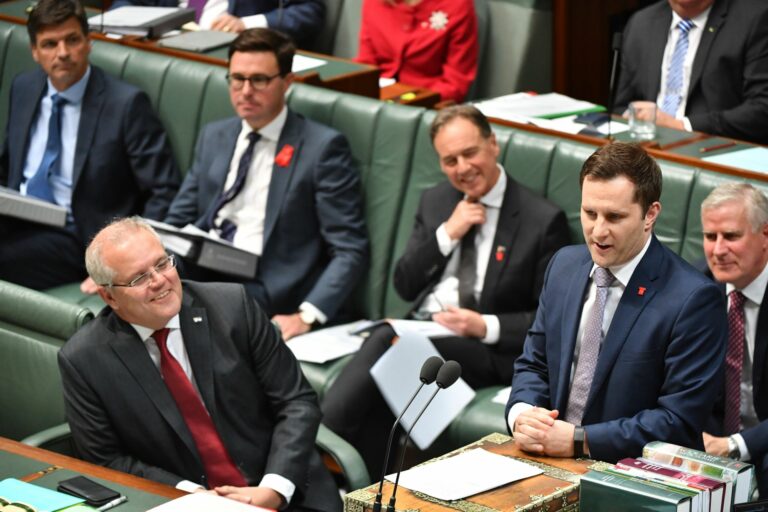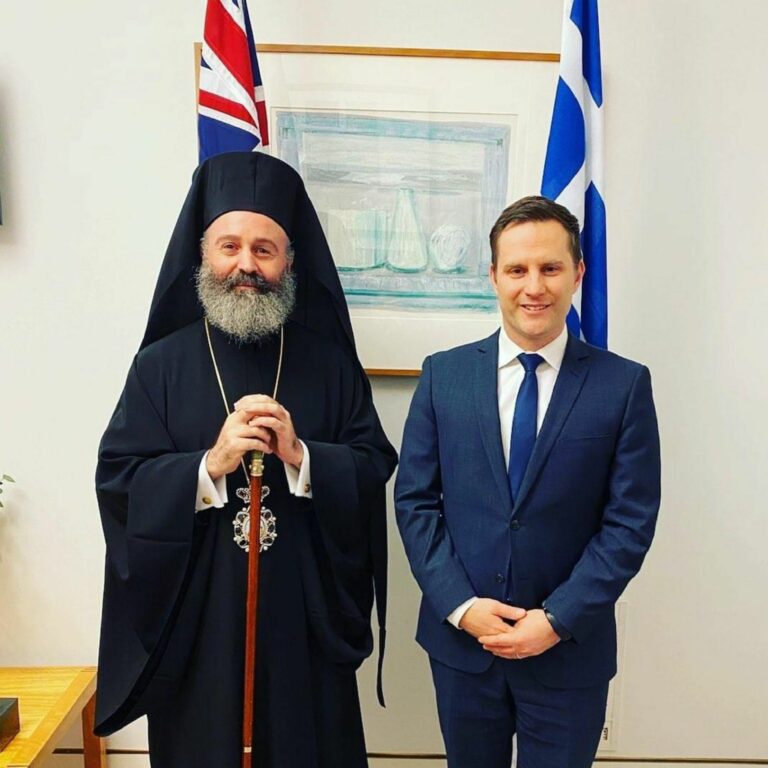There’s no denying that Alex Hawke, the Minister for Immigration, Citizenship, Migrant Services and Multicultural Affairs, is a proud Australian but he is also another example of the Greek Australian success story.
Like many third and fourth generation Greek Australians, he neither speaks Greek (but for a few words), nor has he visited the country, but he does not deny that somewhere in his childhood, a drop of Greek spirit seeped into his soul. Perhaps it came from his yiayia’s cooking or stories of pappou’s efforts in the Resistance from the village of Chortiatis, where the World War II mass murder of 146 civilians, 109 of them were women and girls, took place on 2 September 1944. A week later, the Nazis returned, burning 300 houses down. Few escaped, including Mr Hawke’s family from his mother’s side.
Minister Hawke knows the story well as it formed part of his family’s trauma.
“My mother was born there, in a little village called Chortiatis outside of Thessaloniki, up in the north. And you know my pappou left after WWII, [though he] died before I was born,” Mr Hawke told Neos Kosmos. “He was in the Resistance. They fled after WWII. There was a Nazi massacre in the village… I think many people from Greece understand this story and the horrors of WWII and the aftermath of WWII. For my family it’s quite psychological about going back. My grandparents went back a few times. Yiayia has been back a few times but it was a new life and it was very difficult for them to travel back to some of those regions.”
Mr Hawke said he would like to visit Greece, yiayia’s homeland, “as soon as possible” with his wife, from Croatia, and their four children.
Without his grandparents and mother alive, and without speaking Greek, Mr Hawke will have to figure out his family’s history for himself. He won’t speak the language, but he may feel a chill as he walks the same soil where his pappou fought with the Greek People’s Liberation Army (ELAS) on Mount Chortiatis. The village, even before the Nazi atrocities which took place there, had fallen to the Ottoman Turks who put an end to its rich Byzantine history and, before that, Chortiatis is referred to in Homeric works as Cissus, a member state of the Delian League in the 5th Century BC.
It’s a rich history, but a hurtful one too, and Mr Hawke’s Greek-born mother, who became a teacher in Australia, could not be blamed for wanting to look forward, wishing Australian integration for her son while leaving the pain behind in a town with thousands of years of history.
As one generation moved to the next, it was yiayia that ensured the flame of Greek heritage was kept burning bright in young Alex.
“The church was her life,” Mr Hawke said.
“I was baptised Greek Orthodox of course, and found myself, most of my life, in Greek Orthodox churches one way or another although I was brought up as more of a Protestant.”
He remembers so many people coming to his yiayia’s funeral a few years ago, and has reminiscences when it comes to her cooking as “there is nothing that will ever compare”.
“She made great meatballs (keftedes). She made great koulouria. Everything she did with love. I will never ever find any food better again,” Mr Hawke said.
READ MORE: “See you next time in Melbourne,” Minister Hawke tells Greek Community President Bill Papastergiadis
Learning the language
Communication with yiayia was rudimentary. “There’s plenty of things yiayia would tell me to do in Greek and I would just do them,” he said.
“You see, this was my mum’s big choice. It’s a great regret of mine that Greek was not my natural language. She was a teacher and she wanted me to excel in English,” he said.
The focus was on getting a good well-rounded Aussie education and learning foreign languages was not high on the agenda.
Asked about foreign language opportunities for monolingual people in multicultural Australian, Mr Hawke points out that English is a “good unifying language and it brings all multicultural threads together,” while adding “we respect and absolutely encourage people to use their national languages”.
Unlike Europe, consisting of “dozens and dozens of countries together for thousands of years”, Mr Hawke said British-settled Australia had “one language for the country from day one” while he also acknowledges the aboriginal languages which were in place at the time. That is why unlike Europe, Australia is investing in English learning for migrants more than foreign-language learning for Australians.
Having seen first-hand the struggles of his own family in the early years of their arrival, he is glad of a policy change so that “all migrants now, unlike Greeks and Italians who came here and had to pick up (the English language) themselves, now have unlimited migrant training. It costs a lot of money, but that investment in English for those migrants, wherever they are from, is going to unlock a lot of opportunities,” he said in reference to the Adult Migrants Education Program (AMEP) – a free service to help eligible migrants and humanitarian entrants with low English levels to improve their English language skills and settle into Australia.

Defence and discipline
Last week, Mr Hawke received a promotion in a reshuffle following the resignation of Christian Porter, mainly due to his handling of the recent crisis in Afghanistan.
Prime Minister Scott Morrison commended Mr Hawke for his “extraordinary job” in the evacuation of citizens from Kabul, an incredible exercise done with an enormous amount of effort and great skill”.
Mr Hawke, who came into his role as Immigration Minister fresh from serving as assistant minister of defence, expressed pride in the way the mission went.
“We moved 4,100 people in a matter of seven- to- 10 days in emergency flights in a very dangerous, violent and chaotic situation,” he said.
“Our soldiers on the ground were magnificent. Our Border Force and Home Affairs officials were magnificent. The department people worked there overnight. My office worked 24×7 for a week.
“Australians lean in when there’s a crisis, and we leant in to Afghanistan. We rescued people we had an obligation towards. It was an incredible effort.
“Australians can be very proud in the way our country behaves at this time. We are small but we do a magnificent job when we are required and there’s nobody better than Australians to get in there to help,” he said.
Defence is in his DNA, perhaps because of his pappou’s resistance efforts, but also because he served with the Australian Army Reserve for six years while at university, rising to the rank of Lieutenant.
“I think military service at any time in your life is unique. It’s something you value your whole life. It helps shape you as a better person,” he said, adding “that time in my life was most important in making me who I am today”.
READ MORE: Christmas in Greece a possibility as Australia opens its international borders

Travel and immigration
Who he is today is a new Member of Cabinet, who maintains the responsibilities of a portfolio he took over in December 2020.
“It is important to have immigration in the cabinet. Most people will remember immigration is one of the cabinet portfolios that has been there almost all of Australia’s federated history and it’s a constitutional power, a migration power out of Australia’s constitution and the story of migration to Australia is the central Australian success story,” he said, pointing to it coming back at a “critical time of the pandemic” following the rollout plan which will allow Australian citizens and Permanent Residents to be able to travel back and forth.
“It’s so close now. We’re getting very interested. The Prime Minister is talking about the end of the year at Christmas. I think we’re on track to hit that. And it means we can have a better year next year to see our family,” he said.
Asked about the devastated temporary visa holders of Australia who have been excluded from the easing of border restrictions, Mr Hawke said it is only a matter of time before borders are open to all.
“These harsh restrictions have been there for health and public safety and to save people’s lives. You know I had some people in my electorate up here who we gave exemptions to go. One young guy who had two young kids from India, he went to India, he contracted COVID and he died. He was there to visit the funeral of his grandfather. It was very sad circumstances,” he said.
“I’m sure if he could take that back there he wouldn’t go there and die and leave his kids behind. This is a very real, serious and sad situation. there is risk every way.”
Mr Hawke refers, with optimism, to the rollout plan. “Phase C means we will reopen those borders. Those exemptions will be wound back and people will be travelling again,” he said, adding that all vaccines in Australia are safe and accepted in Europe including the AstraZeneca which in July had not been registered with European drug authorities even though it had the same make-up as AstraZeneca in the UK, the Netherlands and Belgium. At the time European Medicines Agency (EMA) had not approved CSL’s Melbourne facility, however this is no longer an issue and, according to Mr Hawke, people who travel from Australia to Greece having had any Australian vaccine will be considered vaccinated.
“It’s so close now, we’re getting very interested – pretty interested – the Prime Minister is talking about the end of the year, Christmas,” Mr Hawke said.
“I think we’re on track to hit that – and that means we can havea better year next year to see our family. So much for people to catch up on, so many sad things (have happened), people have lost so many relatives overseas and were not able to fix up family issues and so much to do,” he said.
Mr Hawke said that due to the harsh restrictions implemented by Australia, however, “we will have avoided 30,000 deaths”, once we open up.
Much of the success has been due to people’s willingness to roll up their sleeves.
READ MORE: Christmas in Greece a possibility as Australia opens its international borders
“You must remember that Australia is a country that has a world leading rate of vaccination acceptance at the best of times. We believe, we’ll get to 80, we believe we’ll get to 90 we believe we’ll get to the mid-90s in terms of vaccine acceptance. once we get there, everyone is being given the opportunity to have the vaccine. and then it will be safe of course for people to have completely have no restrictions and that is what the national road map envisions as we go forth,” he said.
“It’s so close now,” he said, while looking to Christmas thanks to the willingness of Australians to roll up their sleeves.
“The national program is a voluntary program. People can choose whether to get vaccinated or not,” he said of the Federal government’s stance, regardless of the route state governments were following. “We certainly won’t force people to do that. We’ve never had that tradition in Australia. And you know, it is very hard for governments to force whole populations to do anything, and we don’t agree with that.”
It is the same view he held at a multicultural press conference on 21 July this year, when he told Neos Kosmos that Australia would not follow Greece’s decision to mandate vaccines. He said the government “upfront made a decision, a very important decision not to mandate the vaccine”, adding “in a country like Australia, with a democratic and free tradition, this is a very important decision”.

When one Hawke met another
For Mr Hawke the future looks bright as Australians get their lives back.
He looks forward to travelling to Greece, he looks forward to carrying on his duties.
One wonders how far he’ll go and if we’ll see another Hawke lead Australia in the future.
“I had the opportunity to meet the former prime minister Bob Hawke and he was an exceptional person,” he said, describing the Philhellenic Labor prime minister as a man whose “mind was first rate” and “not just because he had the same surname but because we has exceptional”.
It was the Liberal Party that won him in the end however, mainly due to the Keating years. “The Keating era was very bad when I was growing up,” Mr Hawke said, pointing to high interest rates and a suffering economy.
As treasurer, Paul Keating had dubbed the early 1990s recession as “the recession we had to have”.
READ MORE: Alex Hawke’s maiden speech

These were Mr Hawke’s memories of Australia growing up, and now he is in Cabinet at a time of Pandemic, and the wheel has come full circle. If crises are indeed times of opportunity, Mr Hawke is already showing his clout in the political arena which is a mix of Protestant faith and Greek resilience wrapped in a no-nonsense Aussie approach.